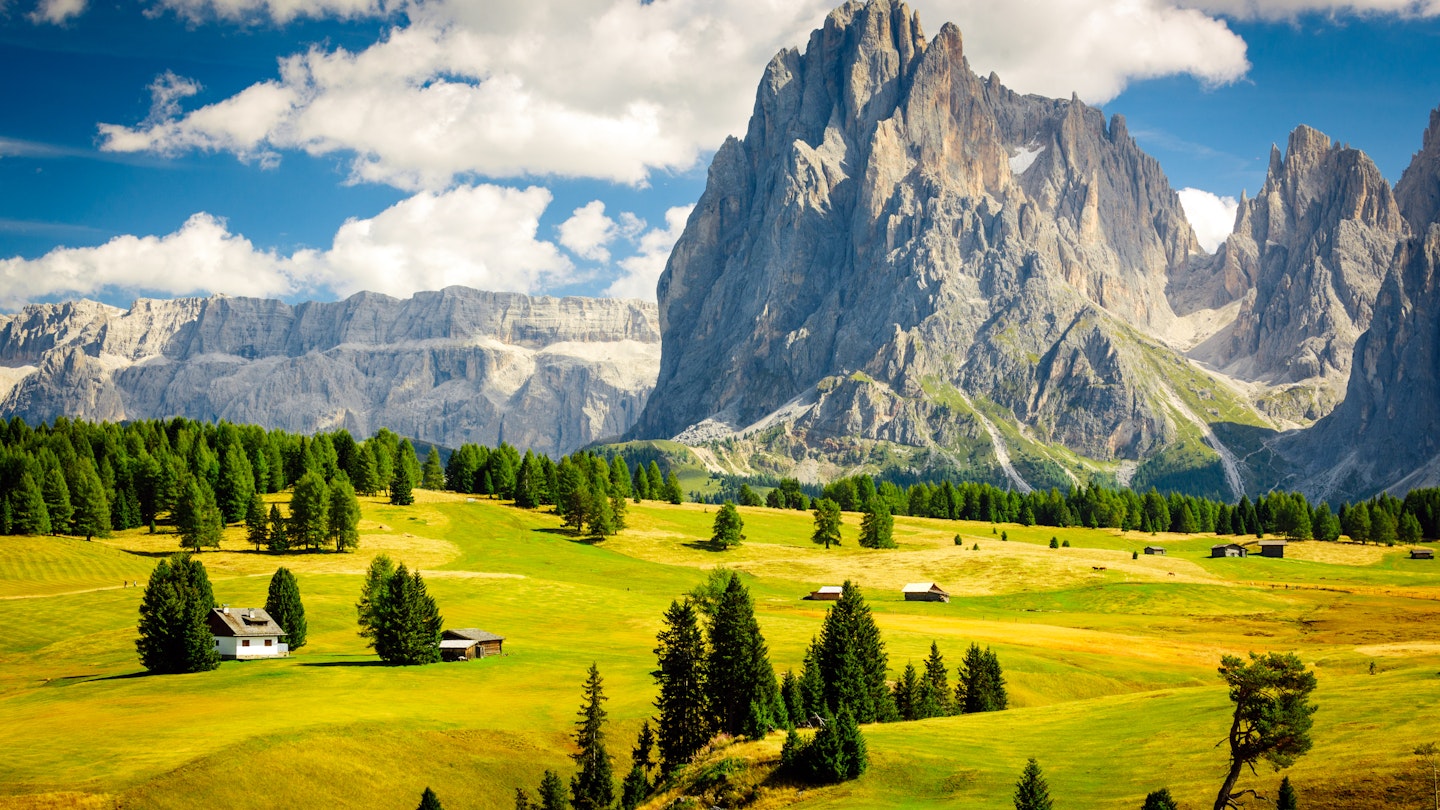Characterised by towering peaks, gushing mountain streams, and verdant Alpine meadows, the historic region of Tyrol spans the borderland between northern Italy and western Austria. It’s the perfect destination for outdoor enthusiasts, as there are a huge range of activities on offer, from hiking and biking to rafting, horse riding, and climbing.
Historically part of the Holy Roman Empire and Austrian Empire, today’s Tyrol is split between two countries and three regions. The northernmost portion is Austria’s Tyrol region, the central part is Italy’s South Tyrol (where the majority of people speak a German dialect), and the southernmost part is the majority-Italian-speaking Trentino region. In 1998, the whole area was declared a Euroregion to encourage cross-border cooperation. Once made up of poor and isolated mountain communities, the region has now thrived as an outdoor destination, particularly in winter when skiers flock to its upmarket resorts.
Innsbruck
Innsbruck is the capital of Austria’s Tyrol region, and its international airport serves as a crucial entry point for the area. The city has much to offer visitors with its attractive architecture in its old town and lively nightlife, owing much to its large student population. However, the real standout feature is its stunning setting in the Inn river valley, framed by lofty mountain ranges.
North of the city, the jagged peaks of the Nordkette rise to over 2000m and are easily accessible by cable car within half an hour from the centre. A funicular runs from the Congress Centre to Hungerburg, then the first cable car takes you up to Seegrube (1,905m), where you can catch the second to the top of the ridge at Hafelekar (2,300m). Numerous hiking trails emerge from both upper stations, and in winter, there’s a ski area, including the famously steep black run down from Hafelekar. A dramatic via ferrata (protected climbing route) runs along the ridge top from Hafelekar, while the challenging Nordkette Singletrail mountain bike trail spans 3.2km down to Hungerburg.
The Ötztal Valley and Area 47
West of Innsbruck, the Ötztal Valley is the longest side-valley, extending right up to the border with Italy at the Timmelsjoch pass. This valley is a fantastic destination for outdoor activities, with hundreds of peaks available for hiking, numerous scenic routes for mountain biking and e-biking, as well as excellent glacier skiing at Sölden and off-piste skiing at Obergurgl. It’s also an excellent destination for climbers, offering dozens of crags and hundreds of climbing routes, including some multipitch options. Additionally, the region features spectacular via ferrata routes, such as one that involves an exhilarating traverse across a single wire above the 159-metre high Stuibenfall, Tyrol’s highest waterfall.
The perfect place for water sports fans is Area 47, located at the valley’s base, where the Ötztaler Ache river meets the river Inn. Whitewater rafting is a highlight, offering two options: a more demanding, technically challenging route from Oetz on the Ötztaler Ache river and a family-friendly, exciting ride along the Inn river from Imst. Area 47 also features canyoning tours, sliding and abseiling through nearby gorges, alongside a fascinating caving tour through tunnels dug by the Nazis during WWII. Additionally, it is home to a massive adventure park with water slides, wakeboarding, climbing walls, and high-ropes courses.
The Dolomites
Crossing into Italy’s South Tyrol region, outdoor adventurers can explore the UNESCO-listed Dolomites mountain range. The landscape captivates with its striking beauty, characterized by pale, vertical rocky pinnacles that glow red during sunrise and sunset. In isolated valleys like Val Gardena and Val Badia, locals reside in charming mountain villages and still speak Ladin, an ancient language related to Latin.
This area is famous for its exceptional hiking, biking, and climbing, plus some of the world’s best via ferrata routes. For a change of pace, consider heading to the Alpe di Siusi, Europe’s largest high-altitude Alpine meadow, with family-friendly hiking routes and bike paths. In the winter, the entire region turns into a playground for skiers and snowboarders, connected by the extensive Dolomiti Superski pass that affords access to 450 lifts and 1200km of ski runs. The quintessential experience is to ski the Sella Ronda, a series of interconnected lifts and runs allowing for a complete circumnavigation of the Sella massif in a day.
Renowned mountaineer Reinhold Messner hails from this region and has dedicated years to establishing the Messner Mountain Museum. This series comprises six museums exploring humankind’s relationship with mountains, each focusing on different aspects of the mountain experience while occupying scenic locales, from hilltop castles to a Zaha Hadid-designed structure situated atop a mountain.
Lake Garda and the Brenta Dolomites
The Italian region of Trentino also encompasses part of the main Dolomites range and boasts its own exclusive range, the Brenta Dolomites, located west of the Adige River. This area offers fantastic opportunities for skiing, hiking, mountain biking, climbing, and via ferrata. It is particularly blessed with mountain lakes, ideal for cooling off during the summer heat. One of the most breathtaking is Lake Molveno, surrounded by the majestic Brenta Dolomite peaks. Experiencing the lake and its towering backdrop is thrilling, especially through tandem paragliding flights, soaring past craggy rock faces over the turquoise waters.
However, the real jewel in Trentino’s crown is Lake Garda, Italy’s largest lake. With powerful and consistent winds prompted by its deep valley location, the lake attracts sailing and windsurfing enthusiasts. Just a few kilometres north, the town of Arco serves as a world-class sport climbing destination. Numerous excellent limestone crags lie within easy access of the town, many offering breathtaking views over Lake Garda. The town, which hosts the annual Rockmaster climbing festival, is exceptionally welcoming to climbers, with local authorities ensuring that safety standards on the crags are consistently high.




